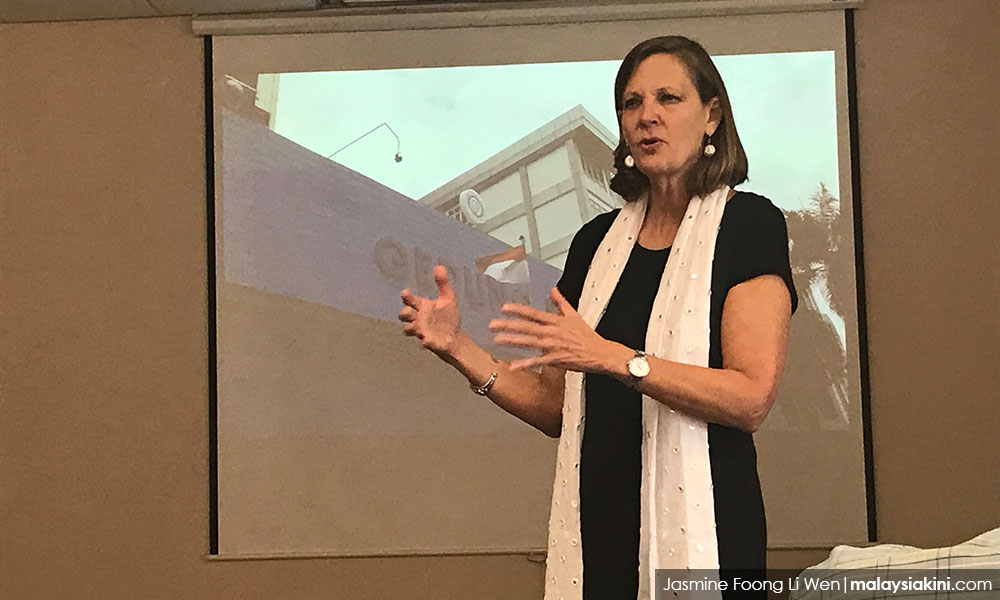
Article 10 of the Malaysian Federal Constitution guarantees Malaysians the right to freedom of speech, but there is a penumbra of laws that restricts this freedom.
These laws can be identified as the Sedition Act 1948, the Communications and Multimedia Act 1998 (CMA), the Printing Presses and Publications Act 1984 (PPPA) and the Anti-Fake News Act 2018.
The Pakatan Harapan government had promised in its manifesto to ensure press freedom by repealing all of these laws, among other initiatives.
However, journalism professor at George Washington University Janet Steele has urged journalists in Malaysia to take initiative in the road to press freedom.
Steele is a frequent visitor to Southeast Asia where she lectures on various journalism topics, including the role of the press in a democratic society.
"You’re really lucky to have this great communications minister (Gobind Singh Deo), but freedom of expression is not a gift from the government.
"It’s not a gift. It’s your right and you can’t wait for the government to gift this to you," she said during her talk on Indonesian journalism at the University of Nottingham Teaching Centre today.
Acknowledging that her opinion could be nullified because she isn’t a Malaysian citizen, she stressed that journalists in Malaysia need to take initiative in realising press freedom because no government in the world enjoys criticism.
"Even if they (the government) are philosophically committed to press freedom, freedom of expression and freedom of assembly, that doesn’t mean that they are necessarily going to be the engine that is pushing it.
"The engine that is pushing it has to be journalists because the other problem is that ordinary people - the rakyat - they’ve also been in school for 60 years," she said, explaining that no school in the country teaches the importance of independent media and the freedom of expression, thus no one besides journalists would be incentivised to push for press freedom.
Steele cited that it was the resignation of Indonesia’s authoritarian President Muhammad Suharto that lead to the country’s press being liberalised, but ultimately accredited it to the active push by Indonesian journalists.
"Suharto resigns on May 21. May 22, AJI (Alliance of Independent Journalists Indonesia) is out there circulating demands (for press freedom). May 28, one week later, the Minister of Information (Yunus Yosfiah) met with the journalists and agreed to all 10 of the demands.
"So, they (the journalists) were not there waiting for Yunus to offer something on a platter.
"They were out there saying 'we demand these things' and Yunus agreed, just as I suspect your minister would agree, but the initiative must come from the journalists."
She added that although press law has given the Indonesian media the freedom it needs to function as a system of checks and balances, there are still provisions in the country’s Criminal Code that can be used against journalists, particularly criminal defamation.
"It’s not perfect in Indonesia, but the thing that I so admire is how journalists have taken the lead in trying to promote change.
"They don’t see press freedom as a gift. Instead, they see it as something you need to struggle for and hold the politicians accountable because… they (the politicians) don’t have much incentive in promoting a situation by which they might be criticised.
"They might believe in their hearts that it’s the right thing to do, but that’s your job. (It’s) not their job."
The journalism professor also addressed the difference between Indonesia and Malaysia. She said that while the Indonesian information minister could revoke the ministerial regulations that controlled the press, Malaysia has multiple laws overriding the constitutional freedom of speech and these need to be repealed.
However, she drove home the underlying message of her lecture, which was that the press themselves have to demand for freedom of speech if they want any government body or institution to legislate those demands. - Mkini



No comments:
Post a Comment
Note: Only a member of this blog may post a comment.